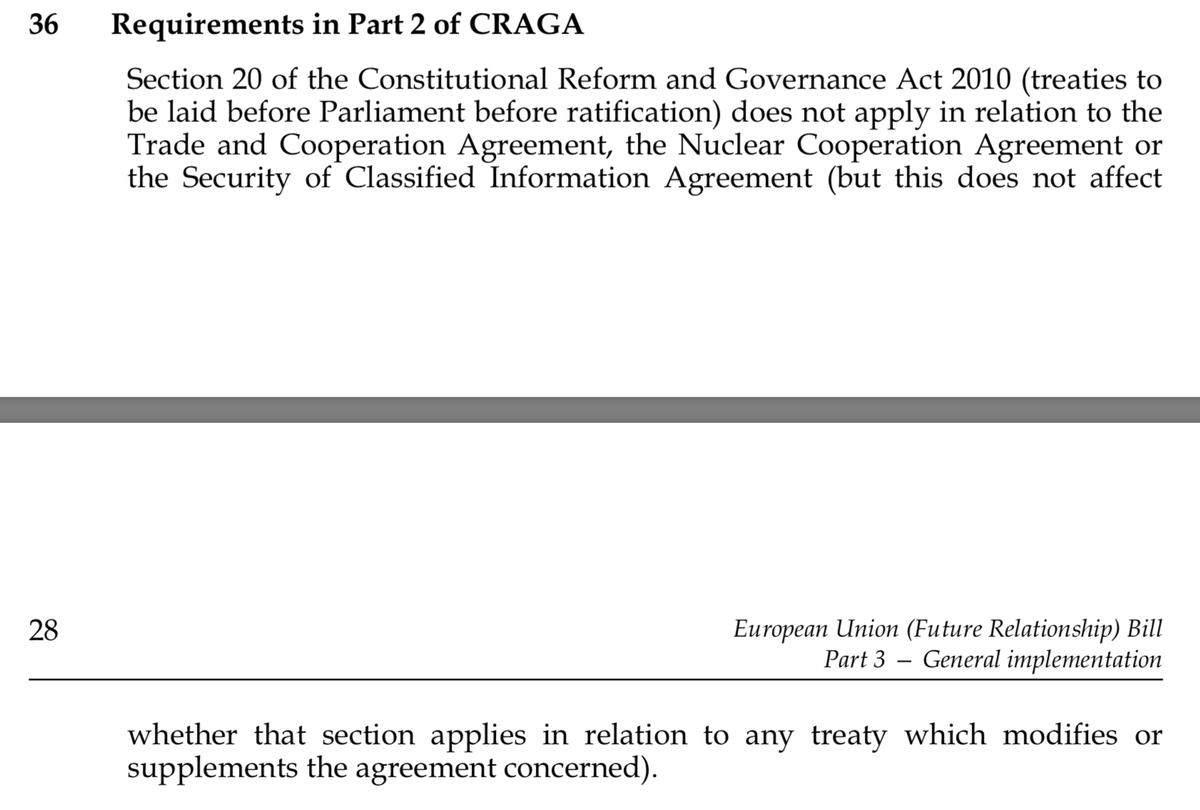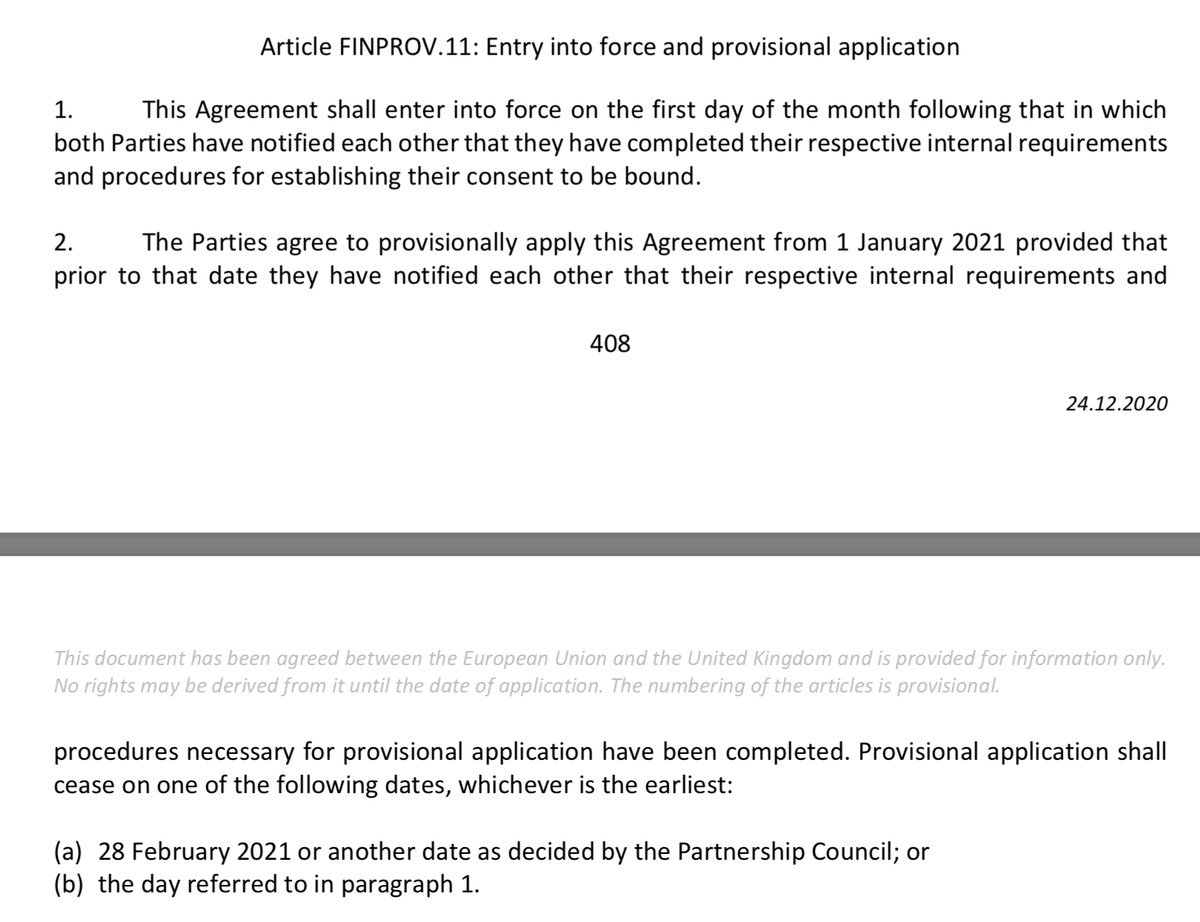
EU-UK TCA - parliamentary scrutiny edition (Thread)
The EU-UK TCA is an EU-only FTA. Technically the partners are the UK and the EU. So let's start with them /2
On the UK side scrutiny takes two forms: debate of implementing legislation and CRaG 2010 treaty scrutiny. /3
The implementing legislation on the UK side is the EU (Future Relationship) Bill. S. 36 of the bill misapplies CRaG scrutiny. So scrutiny on the UK side was Parliament passing the implementing legislation. /4 

The debate that took place on the implementing legislation on December 30 is now available in Hansard. Here's the link /5 hansard.parliament.uk/Commons/2020-1…
EU side. Parliament has more power here. The EP has to approve the treaty to permit ratification. And so the Council decided that for now it can only be provisionally applied. /6
They sort of set a date until which EP scrutiny has to happen in the TCA. Now it seems that the EP - quite annoyed at what the Council did - already said: go and sing a tune. We'll take more time. Which isn't a problem. The Partnership Council can change the date /7 

However, scrutiny has started. Rapporteurs have been appointed (@KatiPiri and @CHansenEU ) and the first meeting was held. Here's a tweet with the link to the recording /8
https://twitter.com/EP_Trade/status/1348658114116149251?s=20
OK. Fun. You might say "ok, so those two processes".
You'd be wrong. States have put in place their own processes for EU acts allowing for parliamentary scrutiny. In the UK this process was stronger than the process for scrutinizing UK treaties. /9
You'd be wrong. States have put in place their own processes for EU acts allowing for parliamentary scrutiny. In the UK this process was stronger than the process for scrutinizing UK treaties. /9
Things differ on member state level, of course. Some might force their government to follow parliament. Some might involve (oh the horror) regional parliaments. Doing a good comparison here is not for twitter. BUT... /10
Whether Member States give their parliaments much of a say or not - truth be told: some Member State Parliaments do and will scrutinize the EU-UK TCA. /11
Thus, the EU Committee of the French Assemblée Nationale will start scrutiny on January 27 (Merci beaucoup à @SabineThillaye pour cette information qui sera très utile pour tous ceux qui veulent comprendre mieux l'accord) /12
https://twitter.com/SabineThillaye/status/1348722918507884546?s=20
The Bundestag will certainly also do its scrutiny - and many other national Parliaments will. If you're aware of a hearing - please feel free to add to the thread. I'll try to amplify.
And - embarrassingly I wanted to tweet this much earlier in the thread when covering the UK, but once you are stuck in "what the law demands" mode you sometimes forget reality: there's an additional aspect of UK scrutiny
And that's select committee scrutiny. Now the role of that is peculiar given it's not linked to the power to actually vote down the agreement or anything like that.
Nevertheless select committee scrutiny is really helpful. The Future Relationship Committee is the intuitive place to scrutinize this agreement. And indeed the Committee started that task.
Here's a link to a session with @CSBarnard24 @SamuelMarcLowe and @RaoulRuparel on Jan 6 committees.parliament.uk/committee/366/…
And here's the next one on Jan 13 committees.parliament.uk/committee/366/…
And... yes... that is it. Because it took so long to get to the deal that we reach the end date of the committee. And despite the excellent work of the committee chaired by @hilarybennmp - it won't be extended. Because.
So my hope turns to the @LordsEUCom . But let's see.
In fact, the Future Relationship Committee could not even hear from the UK Chief negotiator.
https://twitter.com/hilarybennmp/status/1348699147268976641?s=20
The most memorable comment about not extending the Committee is this one from the Lord President of the Council. Which.... is painful to read for anyone who believes in the importance of Parliament. 

That's it for now. Not that I would need to write that - by now I assume that I have successfully put each and every one of you to sleep.
• • •
Missing some Tweet in this thread? You can try to
force a refresh




